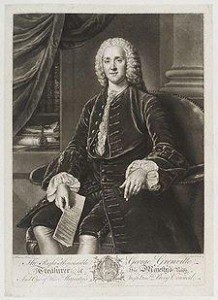Born October 14th, 1712 Grenville’s parents wanted him to become a lawyer. To this end he was educated at Eton and Christ Church in Oxford. In 1736 he was called to the bar.
After his election to Parliament he held a number of ministry positions which included Lord of the Admirality, Treasurer of the Navy and Privy Councillor. In 1762 he was appointed Northern Secretary. In negotiations with France and Spain Grenville demanded much more in compensation than Prime Minister Lord Bute. It was Bute’s ideas that were the basis of the 1763 Treaty of Paris which ended the French and Indian War.
Unfortunately, for Grenville who was certainly a capable politician he will best be remembered for the Stamp Act of 1765 which is often considered the spark that began the American Revolution. Grenville had other options for restoring Britain’s financial stability most notably Franklin’s national currency land bank plan which had been offered to Grenville.
Under this plan new territory in America would be the collateral in a plan issue paper currency in America to assist with trade between the colonies. The British would admininster the land bank and collect the interest payments under Franklin’s plan instead of imposing taxes on the colonies, however, Grenville chose to impose the Stamp Tax instead.
King George III became increasingly distressed with Grenville’s leadership as a result of the American colonies continued protest over the Stamp Act. The King wanted William the Elder to form a new government but Pitt refused and George was forced to accept Lord Rockingham as his last recourse. The King dismissed Grenville in July 1765 and he never held office again.
Grenville’s greatest legislative success occurred right before his death on November 13th, 1770. As a result of the Middlesex election dispute over the election of John Wilkes to Parliament legislation was needed when elections were contested. Wilke’s had authored a particuliarly scandalous article titled, North Britian # 45 that attacked both the King and Lord Bute. Wilkes was barred from Parliament and charged with seditious lible. Middlesex continued to elect Wilkes each and every time he was denied admission to Parliament. Grenville opposed Wilkes opinions but believed that barring his admission to Parliament was unconstitutional. Grenvilled steered a bill concerning the results of contested elections through Parliament ending a major eighteenth century electoral controversy.
After Grenville’s death his ideas concerning government had a brief revival when William Pitt the Younger became Prime Minister in 1784. Grenville’s own son William also served briefly as Prime Minister as well.
